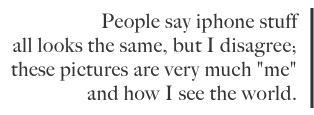

I recently had a discussion about evolution. I argued that the next stage in human evolution was in the brain, in how it functions, and most importantly, how it communicates. I suggested that this shift would be rapid, fueled by advances in communication technology. It so happens that this debate took place after watching David Fincher’s the social network, in which the great Justin Timberlake utters a cocaine-fueled vision of the present/future; We lived on farms, then we lived in cities, and now we’re going to live on the Internet.
This conversation was set against the backdrop of the peaceful revolution in Egypt that successfully used Facebook and Twitter to organize the struggle, report from the front, and bring international pressure on Mubarak to step down. As I write this, these same “social networking” sites are being used to organize movements in Libya, Bahrain, even China (and are being shut down and blocked by their totalitarian governments). I argued that, as these technological systems of communication become more sophisticated they could develop to where we share not only images and thoughts, but emotions and experiences in real time—connecting the social network directly to the empathic regions of our brains. As a result, our higher functioning intelligence would evolve to understand our interconnectedness. This evolution would allow us to see beyond family, friends, country, religion, and could create the framework for empathy on a global scale.
Over the past year and a half I have ended a marriage and abandoned all things homey and rooted. I‘ve had an explosion of work and travel, and I got an iPhone. Normally, I think any discussion of “how” one makes pictures (i.e. which camera, lenses, how they were processed, printed), ultimately has little to do with the meaning, or the point of the pictures. Yet, since in this case the camera I use is literally the same device responsible for my connection to the world—it merits acknowledgement. The iPhone has infiltrated every corner of my consciousness. It is phone, email, Facebook, The New York Times, twitter, NPR, texts, travel guides; camera—it is how I communicate. Often these images were sent to parents, friends, and lovers within minutes of taking them from the device itself. IPhone pictures, for me, have filled the space once held by the childhood postcards I received from my father while he was on the road. With them, I navigate the digital/literal landscape of contemporary society. I use them to import and export my experience. They are my postcards home as I live, homeless.
www.henryjacobsonphotography.com





